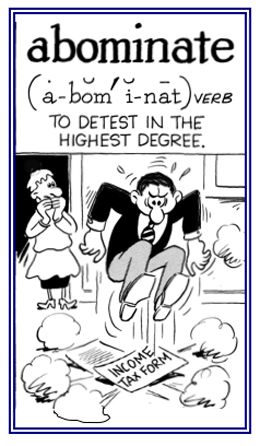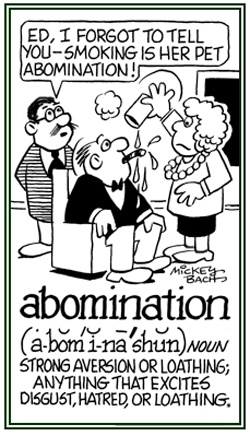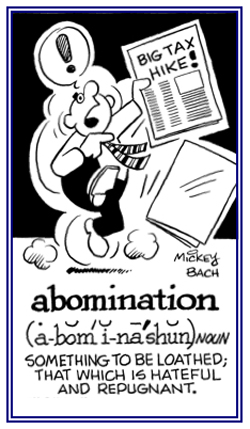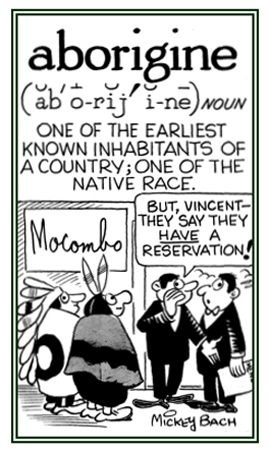a-, ab-, abs-
(Latin: prefix; from, away, away from)
This prefix is normally used with elements of Latin and French origins (abs- usually joins elements beginning with c, q, or t).
The form ab- is regularly used before all vowels and h; and it becomes a- before the consonants m, p, and v. The prefix apo- has similar meanings.
This list is a very small sample of the multitudes of a-, ab-, abs- prefixes that are available in dictionaries and those in this unit are only meant to present a few examples.
2. Anything that has come to an end or stopped: When Vicki was reading the newspaper, she read the column listing all the abolishments which had been carried out by the city council.
The senator fought for the abolition of the current income tax law.
2. The process of doing away with or the state of being done away with, such as an annulment: The students requested further abolitions of unfair practices at the university.2. A social movement aimed at liquidating or getting rid of some law or an undesirable practice: Women led the abolitionism against the production of liquor and the operation of taverns and bars.
Abolitionisms, such as indentured workers or slave-working conditions, are often opposed with vigor.
Abolitionists believed that slavery violated the basic human rights of freedom and so they insisted on making slavery illegal by proposing new antislavery laws for the country.
The most influential publication before the Civil War was Uncle Tom’s Cabin (1852), the best-selling novel and play by Harriet Beecher Stowe, the most famous abolitionist of the time.
Harriet Stowe emphasized the horrors that abolitionists had long claimed about slavery.
2. People who want to destroy a law or practice of some kind: The abolitionists against the cruel treatment of animals included several groups across the entire country.As an abolitionist, Monroe Jones fought to end the practice of slavery in the United States before the Civil War.
The elimination of slavery and the conflict between the abolitionists and those in favor of slavery were factors that led to the Civil War in America.
Nathan had the abominable habit of chewing his fingernails in public.
2. Extremely unpleasant or of very bad quality, or very unpleasant to experience: The abominable food that was served in the restaurant tasted terrible and Jim told the manager that he could be sure that he and his wife would never go there again.The abominable weather during the summer was the worst that people had experienced in a long time.
3. Referring to a bad omen; nasty and disgusting; vile; loathsome: The flood included abominable sewerage that had flowed into the basements and ground floor rooms of the houses.4. Pertaining to a statement that describes something that is deplorable, shocking, or awful: That the homeless were forced out of the shelter this winter was an abominable decision.
5. Etymology: derived from Latin abominari, "to detest something as an ill omen".
From the 14th until the 17th century, the word was spelled abhominable because people thought it came from the Latin phrase ab homine, meaning "away from man", and so, "inhuman, beastly".

Go to this Word A Day Revisited Index
so you can see more of Mickey Bach's cartoons.
Allen has always abominated loud music and could not be tempted to attend a rock concert in the local park.
A politician who is revered by his supporters is also often abominated by his opposition.
2. To detest thoroughly; to abhor: There is nothing that abominates Nellie more than the thought of eating raw meat.The crowd will be abominating the imposition of an early curfew by the local authorities.
The farmers have been abominating the hot and extremely dry weather.


Go to this Word A Day Revisited Index
so you can see more of Mickey Bach's cartoons.
For the ancient Romans, an omen was a sign from the gods or a promise of good or a warning of evil.
Naturally, they turned away in fear from an evil omen. To express this aversion, they combined ab, "away" + omen, "a foreboding, foretelling", into the verb abominari, meaning "to deprecate as ominous", "to abhor"; with a past participle abominatus, the source of English abominate. The word has largely lost its original connotation of dread and has come to mean "to loathe, to hate, to despise".
Stacey's grandfather still has a strong feeling of abomination for the concentration camps that existed in Germany during the Second World War.
2. An emotion of horror, loathing, or shame: Teressa's feeling of abomination for terrorist killings has never changed.3. Something that is perceived as disgusting, awful, or ill conceived: Some people see the sculpture in the museum exhibition as art, while others see it as an abomination.


Go to this Word A Day Revisited Index
so you can see more of Mickey Bach's cartoons.
2. People who thoroughly detest or abhor other people, things, systems, etc.: An experienced team of abominators meet every month to plan protests and rallies against the laws protecting civic inequality.
Indian tribes in America are considered to be the aboriginals in various parts of the country.
The Indians are the aboriginal people of America.
Some of the aboriginal people of Canada are known as Inuit, "the people".
Mike's sister was enrolled in the Aboriginal Studies program at the local university.
There are anthropologists who say that the first aboriginally born Native Americans came from Asia.
2. A reference to where indigenous or original fauna or flora existed or may continue to survive in a geographical area: The animals in these aboriginary regions no longer exist.
The local zoo had an aboriginary section in which the native plants of the region were growing.
2. A member of the indigenous or earliest known population of a region; a native: Many Australian aborigines still live primitive lives away from cities.
3. The native flora (plants) and fauna (animals) of a geographic area: A special species of poppy is among the aborigines native to the desert area.
The first vegetations, or aborigines, of the region have medicinal properties.
4. Etymology: ab-, "from" + origine, "beginning, original" coming from the Aborigines, an Italian tribe from Latium whom the Latins were said to be descended; hence, "original inhabitants of a country".
Go to this Word A Day Revisited Index
so you can see more of Mickey Bach's cartoons.
2. To cut short because of some failure in equipment: The pilot aborted the flight because of radio failure.
Failure of the radar system will abort the flight of the spaceship until another day.
The family will be aborting their trip to the arctic because of the early onslaught of winter.
3. Etymology: originally, "to set" or "to disappear" (as the sun). Composed of ab-, "from" + oriri- "to arise"; the part of the sky, or the world, in which the sun rises; the East.

